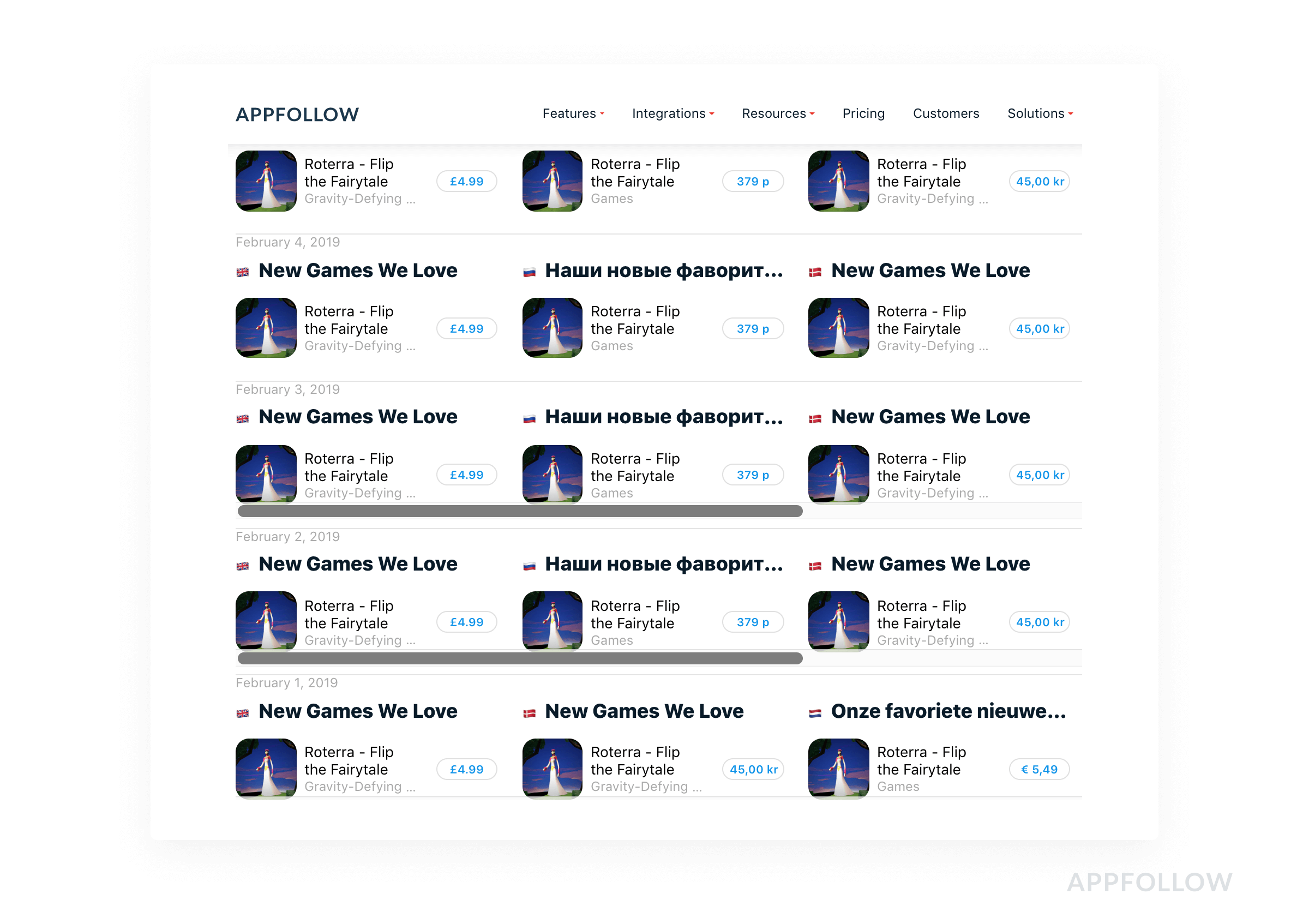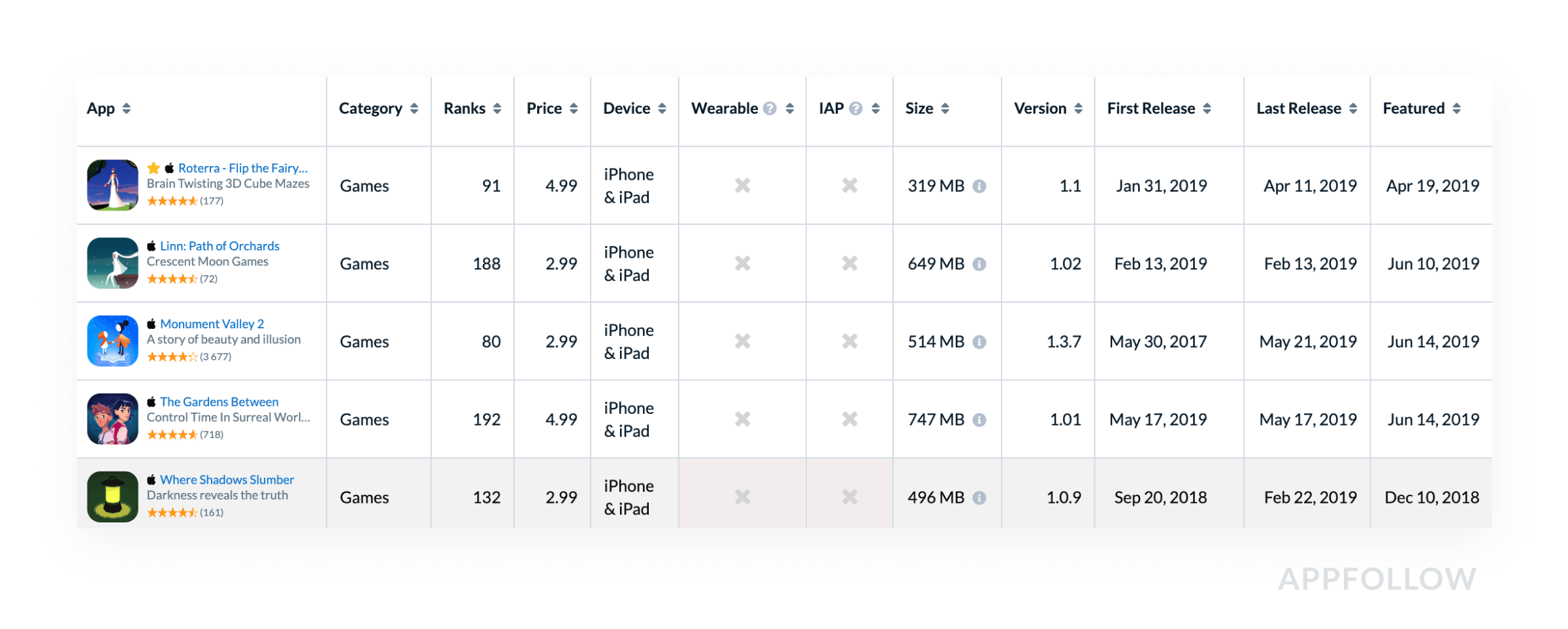Three Hacks to Skyrocket Your Indie Game Marketing

Table of Content:
Competing with the top chart games in the App Store is really tough. Stuart Claggett is the COO & CTO of Dig-iT! Games, shares his insights on how to launch a successful indie game. Roterra is a puzzle-adventure mobile game in the App Store that has reached a #1 ranking in the puzzle genre. Despite a recent launch at the beginning of 2019, it has already won a place among the featured paid apps.
The time has come to launch your new game in the App Store. You have worked out your bugs and game-play, received positive reviews from testers, but are you ready to market your game too? Many will say if it is a good game it will market itself, but that is not quite true — you are a minnow in the ocean of other games in the App Store.
There are many factors involved in launching a game, and we are going to highlight 3 of them where AppFollow has provided important insights and a great tool to support the Roterra marketing campaign.
App Reviews Impact Your Success
Feedback on your game or app can make or break it in the App Store. Their influence becomes even more important when a game is paid or has in-app purchases, as in this matter users always rely on other peoples' opinions.
Why you should keep track of app reviews and how they impact your conversion rate and downloads.
Your ratings and reviews are readily available for developers via App Store Connect. Be aware that by default it shows you only recent reviews, and sometimes it’s easy to miss a critical one.
As indie developers we greatly appreciate the time-saving features provided by AppFollow’s Ratings and Reviews. At a glance, you get a worldwide perspective and can easily drill down country by country.

It is extremely helpful to see featured reviews from different countries. The App Store Connect doesn’t have such a feature, and you can only see featured reviews from your device. A lot of developers may not even know that featured reviews are driven by feedback being marked as helpful. Also, remember that you are launching to the whole world, and your device is only showing reviews for one country.
signup_boosting
We don’t have so many reviews that we are overwhelmed, and are capable of responding to them the same or the next day. This helps us keep the rating and level of satisfaction high, and deal quickly with any bugs or issues as they happen.

To react faster we use integration with email and receive a new or updated review once Apple has received it. It is a great way for members of the team to work with user feedback in a collaborative tool like Slack or Microsoft Teams.
From what we have seen, there are not going to be an avalanche of reviews for most indie devs. But all user feedback, and even more beta-feedback is valuable before you show your app to the world, and helps you to improve your game. Embrace it and be courteous in all your responses.
How to improve the way you work with users.
Getting Featured Is Your Best Friend
One of the challenges of being an indie developer is being somewhat siloed in your view of the world with respect to the App Store. Your team is probably in one, or just a few countries. You may look at your phone every day to check your ranking, and one day see that Apple has featured you in some way or made you game of the day! But if you are expecting Apple to actually send you an email, then you are mistaken. The only clue you receive that they are considering it is when they make a request for additional art, but even that is no guarantee.
For Roterra, we were first featured by Apple in the collection “New Games We Love”. We are located in the United States and saw it on the Games tab of the US App Store. However, it was AppFollow that told us through their Featured timeline that we were actually featured in 11 countries, not just the United States. How amazing was that!

The Featured timeline tool is a major asset to any indie developer. It continues to tell us when we are featured in a collection in countries around the world. The most amazing moment was when we saw 24 hours in advance that we were going to be Game of the Day in the US. This allowed us to plan in advance to convert as many page views as possible. Our game is a premium title and that price wall can often act as a roadblock for conversion. Armed with the knowledge that we were about to get about 4 million impressions, we dropped our price. This led to an increase in the conversion rate of 100% on Game of the Day. Having the intelligence to plan for a marketing event was only possible with these data insights.
The historic data in the Featured timeline also gave us key insights on what to expect and when. It gave us a perspective on how Apple features games over time and how previously launched games in our genre were featured. We could review their timelines and know the time frame we might expect to be featured as Game of the Day. This allowed us to plan a release update to add 8 more languages to Roterra before that feature date.

Our next Game of the Day was in the Korean App Store, which we would have never known about without the insights from AppFollow.

The Featured timeline has alerted us that Roterra has been featured in multiple collections during various date ranges around the world. This has allowed us to better understand why a spike in sales may be occurring in a country, or unfortunately how it had little impact. We now have a better understanding of where to concentrate our limited marketing budget, for example into Apple Search Ads. If a collection cannot move sales, then ads are probably not going to work in that country either.
Dreaming about getting featured? Find out how to get it.
Competitors Are Worth Analysing Well in Advance
Understanding the App Store market requires research which equals time and often limited options. For many, this is an afterthought, and to be honest that can be a big mistake. Planning for the market needs to start when you have the first solid Alpha of your product. Once you get to a solid Beta, do more research.
We were a little late finding this tool, and wish we could have used it earlier. We would recommend an indie developer start using it for competitive analysis 90 days prior to launch.
There are numerous things you need to analyze:
- Recent updates
- Keywords and positions
- Reviews and app ratings
- Previous featuring
- ASO updates
- Price history of competitors
- Ranking of competitors over time

You can also see ratings and reviews of competitors by adding their apps to your dashboard. Use this feature in advance of your launch to quickly see what users like or dislike about similar products. It might confirm that you are good for launching or give you pause for thought as to whether you are actually launch-ready.
Do you need to invest in a tool like AppFollow before the launch? Since it is a monthly subscription, you could jump in for a month and get a market snapshot for 30 days, and then do your analysis. Don’t be short-sighted in not spending the time in undertaking an in-depth review the market. It will help set better expectations, improve your chances of success during pre-launch, launch and post-launch.
Summary
We use more than one tool for our market analysis and that includes App Store Connect which you have by default. AppFollow is generally the first dashboard we look at for daily insights. Some indie developers might feel they can’t afford this. I have seen numerous indie posts about the lack of marketing dollars. Finding a way to grow your marketing budget and deploying tools like AppFollow is going to give you a head start on your competition. Games don’t sell themselves.
Share your app or game story with us!
--









